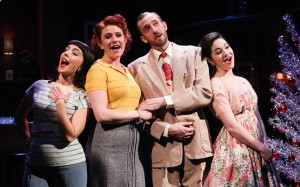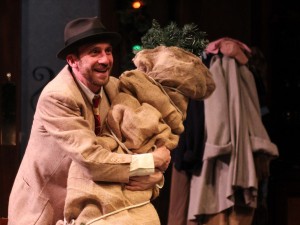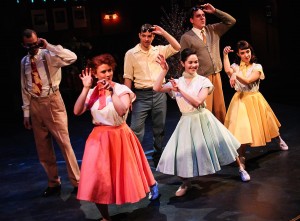
Submitted by Harlequin Productions
I was lucky enough to sit down with the mysterious Harlowe Reed for an exclusive interview with the author of the Stardust Musical.
 Where do you find your inspiration for story lines?
Where do you find your inspiration for story lines?
Inspiration is everywhere, but largely it comes from having watched actors work in other projects and beginning to see Stardust characters emerge. These are situation comedies, so the next step is finding a situation. The ideas for the situations or problems are one percent pure luck that must be supported with the ninety-nine percent hard work.
Do you ever decide to abandon plot concepts mid-way through writing?
If a plot will be abandoned, it needs to happen right at the beginning. That’s the place you have to recognize that you’re headed to a dead end. Not half-way through. Once you are committed to a storyline, you tend to make it the story you want even if it requires a staple gun, a shoe horn, and bailing wire. If a sledgehammer is needed to get you to the finish line, you’ll know better next time.
Any particularly strange Stardusts we almost had?
They are all strange. We joke about various concepts like setting the show in the Star Wars Cantina or in a remote future where all the performers are robots or clones. These ideas are unlikely to be explored anytime soon; however, the Cantina version has its attractions. I always loved the jazz combo in that scene.
Do you have any favorite Stardusts past?
Naturally the shows I like the best are the shows that audiences like the best: Stardust for Christmas, Operation Stardust, The Stardust Serenade, and last year’s Stardust Christmas Blizzard rank high. But, as you know, the real favorite is always the one you are working on at the moment.
Do you find that your original vision usually comes to fruition in the final product, or does the vision tend to evolve during a process?
It has absolutely got to evolve in the process. It can’t be helped. The performers bring their own brilliance to the project and new and irresistible possibilities come to life. And that is what makes the “original vision” viable. You have to begin with raw eggs to end up with an omelet. The ideas are the raw eggs BTW …not the actors. With an original script, you can’t go in thinking it’s already cooked. That’s a formula for disaster. You might get a disaster anyway, but the chances are greatly reduced by letting it morph organically into its true potential. This does, however, require knowing what and what not to keep. You have got to know a speed bump for what it is.
How has your writing style changed over these 19 years?
Writing comedy is trial by fire. You learn the hard way what has a chance of working and what makes it work when it does. I’ve learned a lot about tempo and phrasing. I like broken and overlapping lines because it’s the way people actually banter with each other. Smart actors can do that, but the tempo has to be correctly balanced in the line. Also, consonants are vital. Finding the clear words that help actors communicate a feeling or situation to the audience can be the difference between keeping them with you or confusing them. I’ve done the confusion part and now attempt to do something else. I also used to be much more sentimental. We still want a happy ending, but keeping it terse actually seems to make that more rewarding.
What led to your decision to move from the 1940’s to the 1950’s?
We spent seventeen Christmases in the 1940s, mostly the war years. We covered well over 200 songs from the period. Most of them were ballads. It’s time to move it to the 1950s and the more upbeat popular music of that decade. It was an optimistic time, maybe the last non-cynically optimistic period in American history.
 What do you love about this year’s feature?
What do you love about this year’s feature?
The homeless youth element and the way it resonates with contemporary problems. His situation is a catalyst for a sequence of crazy events that (I hope) keep us engaged and rooting for everyone concerned.
What would you say is the thesis of this entire body of work?
Simple: The Stardust Series is really a collection of big noisy Christmas cards. These are alternative holiday shows that provide a bit of added cheer and entertainment. I have nothing as lofty as a “thesis,” but the intention to reach out to the community with a happy offering has endured.
Do you have any relation to Fletcher Reed, Jim Carry’s character from the 1997 smash Liar, Liar?
Sadly, no. That was one of Jim’s better roles. I am, however, tangentially connected to the journalist John “Jack” Reed (1887 – 1920). He was born in Portland, Oregon, lived for a time in Greenwich Village. He had Communist leanings and wrote prodigiously about the Russian Revolution and was given a hero’s funeral when he died in Moscow. Obviously he got in lots of trouble. I’m nothing like that.
Do you spend much time with the Director, the fabulous Linda Whitney?
Collaboration is required to pull these things together. Time is an imaginary concept.




















































